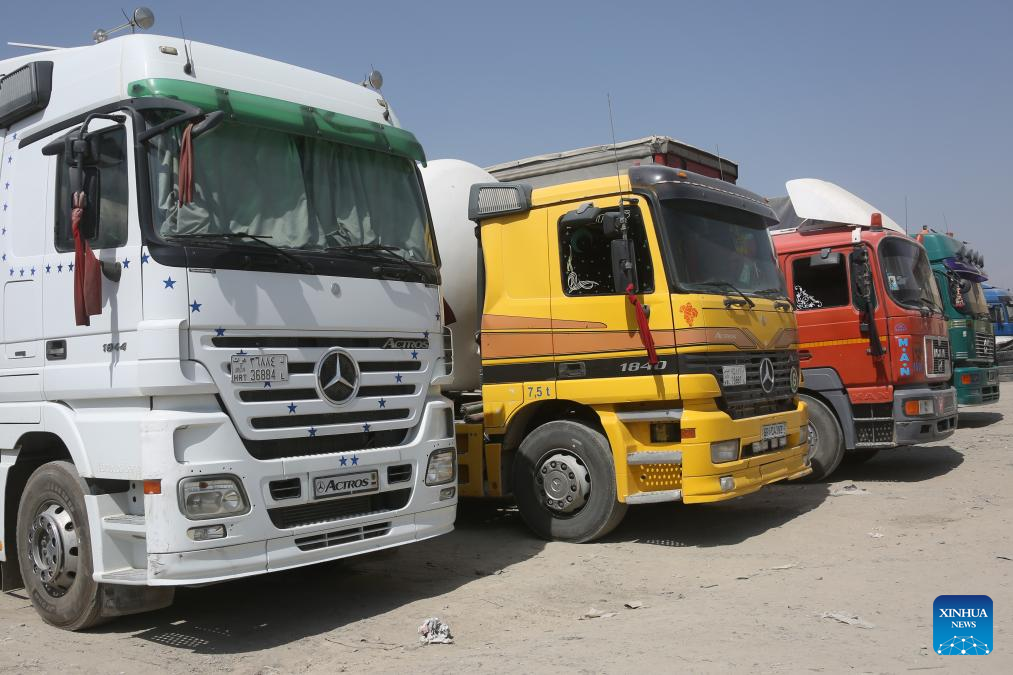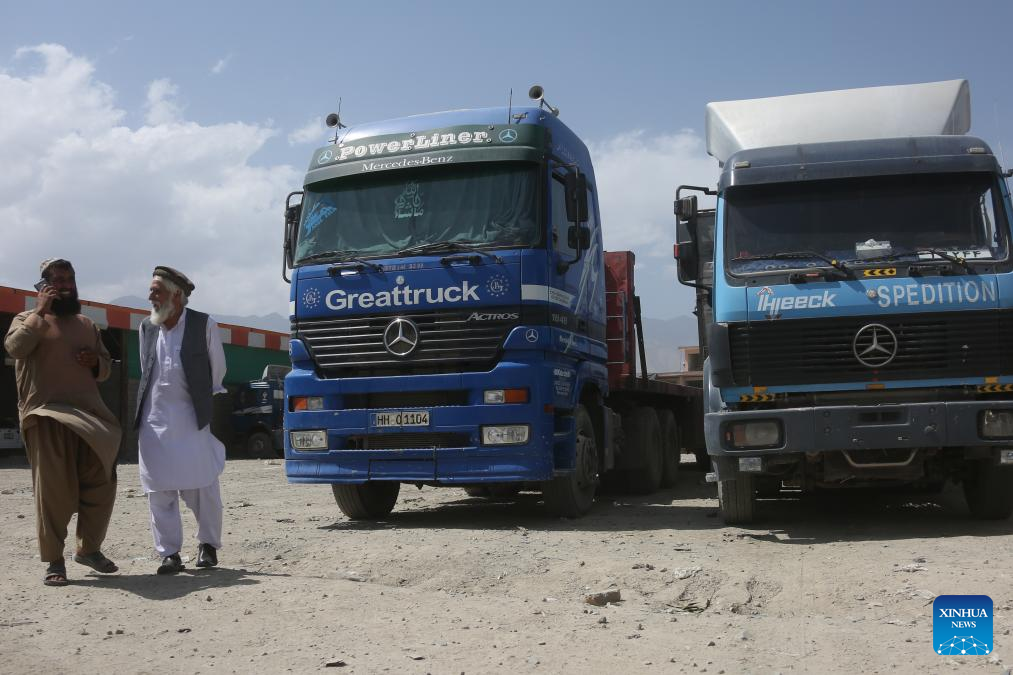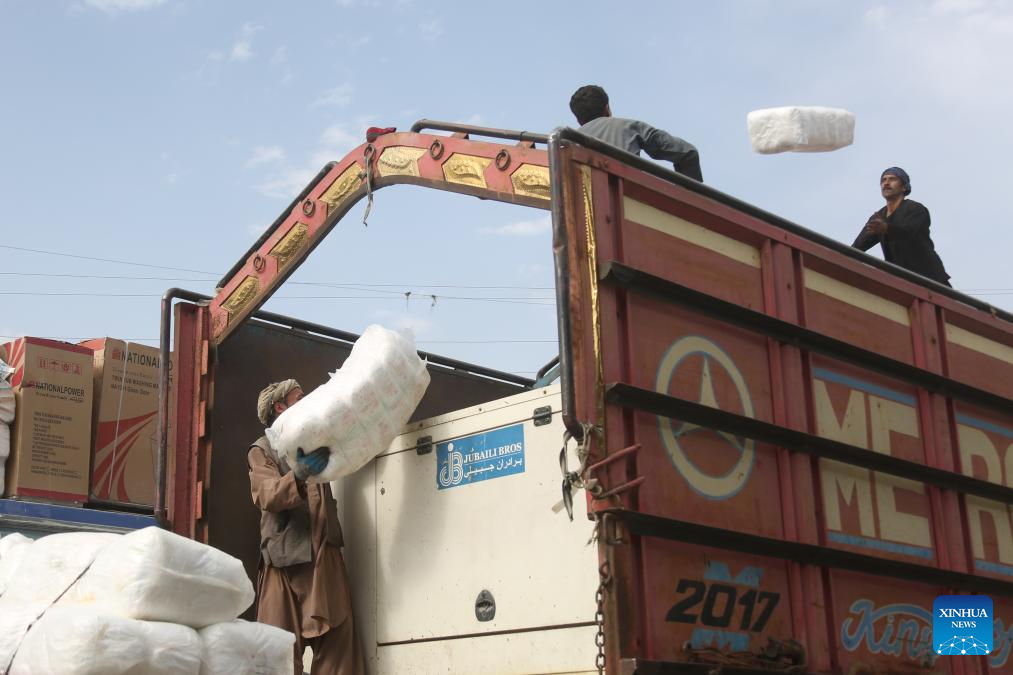
Trucks are pictured in Kabul, capital of Afghanistan, Aug. 27, 2024. (Photo by Saifurahman Safi/Xinhua)
KABUL, Aug. 29 (Xinhua) -- Standing beside his truck at a parking lot in Qala-e-Haidar Khan area of the Afghan capital Kabul, driver Mohammad Mohammadi expressed cautious optimism about efforts to reconstruct Afghanistan's war-damaged highways and build new roads to revitalize the beleaguered transportation system.
In August 2021, U.S.-led troops left Afghanistan, ending a two-decade-long war. Afghanistan's highways, which link Kabul to other parts of the country, have been severely damaged due to the war, leaving the nation's land transport infrastructure in dire straits.
"If the highways are completed as planned, it would have a 95 percent positive impact on our work and income," Mohammadi told Xinhua. "Our vehicles wouldn't be damaged often, and our earnings would increase, benefiting both drivers and the people of Afghanistan."
Having returned from the western Nimroz province which borders Iran, the exhausted driver recounted the grueling round trip, which typically takes four days each way due to the dilapidated state of the roads.
"Roads were built and destroyed by them (foreigners) again. In the past 20 years, one day, the road was good, and the next day the road was destroyed," said Rahmatullah Mujahid, head of Transit Shams Arghistan Transport Company.
A decrease in cross-border trade has made their situation even worse. Mohammadi said that the volume of goods he transported has fallen about 70 percent. Mujahid also expressed a similar concern.
"We had 6,000 vehicles in our company, and now we can not load 30 trucks in a month," said Mujahid.
A huge number of foreign institutions and companies followed the withdrawal of the troops. Washington also carried out rounds of sanctions and froze more than 7 billion U.S. dollars of Afghanistan's central bank in the United States.
International trade has dropped drastically in the country over the past three years, leading to a decline in incomes of truck drivers who are mostly engaged in cross-border trade.
Once the breadwinner for a six-member family, Mohammadi now struggles to make ends meet. His monthly income, which once ranged from 30,000 (about 425.5 dollars) to 32,000 afghani, has plummeted to between 7,000 and 13,000 afghani.
Nevertheless, he expressed appreciation for improved security on the highways, where blasts almost happened every day three years ago. "Security is 100 percent (okay) on the highways now, and we can work day and night without fear of being disturbed," he said.
Another driver, Khawaja Bashir, who regularly travels between Kabul and the northern city of Mazar-i-Sharif and supports a 28-member family, said his earnings have dwindled to 30,000 afghani per month, and it was barely sufficient to cover expenses for his big family.
"Three years ago, I could make six trips between Kabul and Mazar-i-Sharif each month, but now it is three," Bashir said. He attributed this decline to reduced economic activities, which has had a cascading effect on transportation demand.
Bashir also criticized the United States for freezing Afghan assets. "If this money is released, it will create job opportunities, boost business and encourage investment," he said.
Despite his grievances, Bashir remains optimistic about the reconstruction of the highways, as Afghan authorities have been eyeing repairing and asphalting roads despite ongoing sanctions and a lack of international aid.
"We currently spend 500 dollars on a pair of tires that can be used for three months. If the roads are asphalted, they could last for six months," he said, praising the government's ongoing efforts on nation-rebuilding. ■

People talk beside trucks in Kabul, capital of Afghanistan, Aug. 27, 2024. (Photo by Saifurahman Safi/Xinhua)

Workers load goods onto a truck in Kabul, capital of Afghanistan, Aug. 24, 2024. (Photo by Saifurahman Safi/Xinhua)



